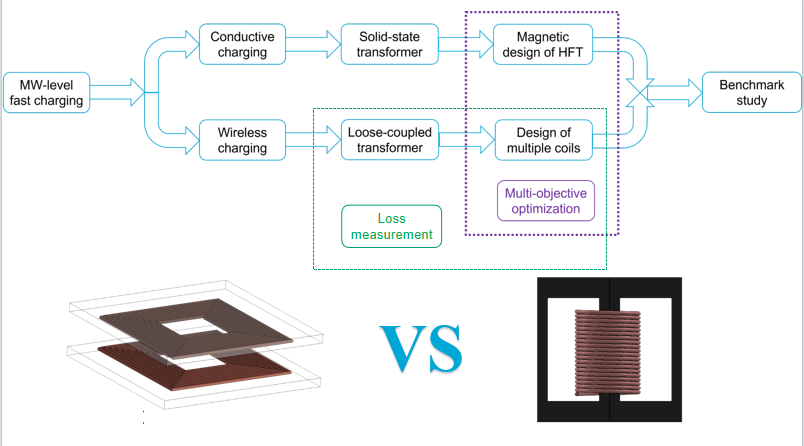Electric Propulsion for Hybrid Aircraft
Electric Propulsion for Hybrid Aircraft

Project description
Fast charging of heavy duty electric vehicles (1 MW up to tens of MW) would require beyond-the-state-of-the-art charging voltage and current levels (> 1.5 kV, > 1000 A), which brings unprecedented electric/thermal loading and stress, mechanical weight, electromagnetic interference into the charging system. These physical limits should be studied, modelled and analysed to achieve the optimal trade-offs for the system design considering the system efficiency, cost, scalability, safety and reliability.
With existing conductive charging technology, fast charging of heavy duty electric vehicles needs a solution with multiple chargers, thick conductor areas and heavy connectors. Moreover, a dedicated mechanical actuator should be adopted to avoid electrical hazards brought by high voltage, high current and heavy mass. The wireless charging solution based on galvanic isolated resonant transformers enables charging without physical contacts, which brings flexibility to charging and provides intrinsic safety by avoiding electric sparks caused by conductor contacting, which is crucial for mine applications. Conventional wireless charging system uses single phase converters and transformers. However, as the system increases in power, it becomes more challenging to meet the leakage field constraints. A modular multi-phase system can achieve higher power transfer capability while meeting the field emission and foreign object heating limits. Modular multi-phase charging transformers and converters are also feasible approaches to multiplexing operations.
The PhD candidate will study both the conductive and wireless solutions to the high power fast charging of heavy duty EV in a systematic way, especially focus on on system optimization and solid-state transformers/coils designs. The physical limits, design constraints and search space will be thoroughly defined to ensure high efficiency, high power density, and safe operation. Innovative modular system topologies will be proposed and benchmarked with various existing solutions. Multi-objective optimisations of the system will be carried out to realize high efficient operation while meeting the safety, volume and mass constraints for both solutions. Finally, downscaled prototypes with possibility to scale up will be developed to demonstrate the feasibility and advantages of the proposed solutions. A technical roadmap to scale the system to 4-40 MW level will also be delivered.
PhD Candidate :
Zichen Deng : Z.Deng-4@tudelft.nl
Supervisor:
Dr. Jianning Dong : J.Dong-4@tudelft.nl
Promoter:
Prof. dr. ir. Pavol Bauer : P.Bauer@tudelft.nl